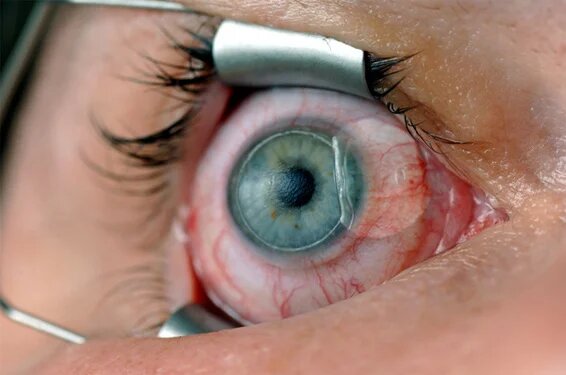Lasik presbyopia
Standard LASIK (Laser In Situ Keratomileusis)
 Lasik has 2 stages:
Lasik has 2 stages:
The cutting of a thin corneal flap.
Then the action of the excimer laser.
1st time
Cutting of a superficial corneal flap or "hood" (100 to 160 microns thick).
Using a micro plane (microkeratome), which cups the eye.
This “hood” attached to the cornea by a hinge will be lifted.
2nd time
The corneal stroma being exposed, the excimer laser can be applied.
Then the flap put back in place without sutures adheres in a few minutes.
Most often both eyes are treated in the same session in 30 minutes.
Before presbyopia lasik surgery
A complete ophthalmological examination is essential before any refractive surgery.
Profession, age, pregnancy (wait 3 months after giving birth).
Clinical signs: dry eye, Roaccutane treatment, herpes, glaucoma, diabetes, pregnancy, inflammatory and immune diseases , visual impairment in one eye (amblyopia).
Sight measurements and optical corrections: a stable visual defect is essential.
Examination under the microscope: cornea, lenses, retina, pupil size.
Eye pressure measurement.
Corneal topography (Orbscan): determines the shape and thickness of the cornea, detects keratoconus.
ORA tests corneal elasticity.
The OPD detects high degree optical aberrations (HOA).
Remove your contact lenses before preoperative examinations and before surgery:
Flexible: 3 to 8 days.
Stiff: 1 to 3 weeks.
During presbyopia lasik surgery
The surgical act is fast (30min for the 2 eyes). The anesthesia is local by a few drops of anesthetic. Sometimes a relaxing premedication is necessary. The patient is lying on the operating table located under the laser, the head is positioned horizontally. The surgeon brushes the eyelids with an antiseptic product (notify me of any allergy to IODE), then sets up a plastic operating drape on the region of the operated eye. The unoperated eye is hidden by an ocular disc. An eyelid maintainer is used to keep the eye open and to prevent it from blinking. For PKR: the peeling of the cornea will be carried out painlessly. For Lasik or Intralase laser:
Preparation of the corneal flap: A suction ring will exert a slight pressure on the eye to block it, then the flap is cut out (Microkeratome or Intralase). The fixation light disappears for a few seconds and returns as soon as the suction ring is removed, the corneal flap can then be lifted.
The Excimer Laser is then activated: The patient is asked to quietly stare at a flashing red fixation light. The cut lamella, held by its hinge, is placed outside the field of the laser and the laser treatment can begin in the depth of the corneal laminae. The laser application time varies according to the defect to be treated (longer for strong myopia and hypermetropia). This phase is painless, the patient hears a crackle corresponding to the impact of the laser on the cornea. Do not worry if the eye moves and it no longer fixes this red light, the laser stops automatically (eye tracker active).
The laser procedure being completed, the lamella is repositioned.
In PKR a dressing lens is put in place for a few days. A few drops of antibiotic are instilled.
Currently in lasik the treatment is most often bilateral and simultaneous (both eyes at the same time). Its advantages: reduction of stress, less movement and absence of optical shift between the 2 eyes.
After presbyopia lasik surgery
The patient stays in the rest room for 15min then goes home, accompanied, most often without shell or dressing, with protective sun glasses. A local treatment is prescribed for at least 8 days. A complementary treatment will then be prescribed. For 3 to 4 hours after the procedure, the eye is uncomfortable (tearing, burning sensation, blurred vision, discomfort in the light). In case of pain, especially after PKR, an analgesic can be taken as soon as you return home , treatment with antibiotic and anti-inflammatory eye drops should be started. It is strongly advised not to rub your eyes during the few days following the operation.
Pregnancy and excimer laser?
Pregnancy is a contraindication due to the rare possibility of vision changes during pregnancy. period. Wait 3 months after delivery.
Is presbyopia lasik surgery painful?
No. The lasik operation is not painful, but sometimes unpleasant: tingling sensation, tickling or light pressure on the eye.
Presbyopia excimer laser: local or general anesthesia?
The anesthesia is local by numbing drops. No general anesthesia because your attention is necessary to fix the laser light, so that the treatment is perfectly centered.
You see blurry up close - Presbyopia -
You are considering an operation for presbyopia, which technique to choose? You are presbyopic and sometimes also myopic, astigmatic or farsighted. Depending on your age, your profession, your visual needs, surgery for presbyopia may be considered. The pre-operative examinations will guide you towards the most suitable solution in your case: PresbyLasik, IntraCor, MultiFocal Implant, Accommodative Implant.Your presbyopia is:
Associated with myopia: monovision or optical flip is the reference method; the dominant eye will be favored from a distance, the dominated eye from near.
Associated with farsightedness: gives the greatest percentage of success, both in far and near vision .
Associated with astigmatism: the technique will be adapted for each patient.
For pure presbyopia, the Intracor* femtosecond laser and the accommodating Crystalens HD implant are being studied.
Surgery for presbyopia will in any case bring you a very clear improvement quality of life, better visual comfort. Finally, you will no longer have to constantly wear corrective glasses or contact lenses.
When can you swim after presbyopia lasik surgery?
After 3 weeks.
When can I smoke after presbyopia lasik surgery?
Avoid smoking in an enclosed area due to dryness and irritation induced during eight days.
Presbyopia lasik price
The cost of Lasik Excimer for both eyes is 1850 Euros including exams and a stay of 4 days with full board.